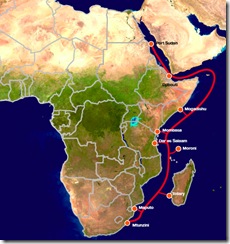Qtel has posted a robust set of Q1 2010 financial results, with net profit attributable to shareholders soaring 104.3 per cent to QAR 1.2 billion (US$330 million) from QAR 549 million a year earlier. Revenues increased more modestly, growing 14.2 per cent from QAR 5.6 billion in Q1 2009 to QAR 6.4 billion for the quarter ending March 31, 2010. A strong EBITDA performance was also achieved with EBITDA rising 14.4 per cent during the period to QAR 3.0 billion.
Group subscriber numbers across 17 markets gained steadily growing from 55.87 million to 67.68 million year-on-year.
"We have continued to advance across all areas of our operations in this first quarter, building on the positive momentum generated during 2009, most notably in markets such as Iraq and Indonesia where progress has been particularly encouraging,” commented Nasser Marafih, chief executive of the Qtel Group.
“We continue to prove highly successful in our efforts to defend and even expand our solid market positions in those markets where competition is heightened. At the same time, we have retained sufficient flexibility in our operating model to be in a position to respond quickly to opportunities and challenges as they arise," he added.
Review of operations by market
Qtel, Qatar
Qtel took a dent in its home market revenues following the introduction of competitor Vodafone, declining 6.4 per cent year-on-year from QAR 1.5 billion in Q109 to QAR 1.4 billion a year later. EBITDA also dropped 20.3 per cent to QAR 712.8 million from QAR 894.4 million.
However, the company said the impact of competition is offset by the reduction of the royalty fee from 25 per cent of profits to an industry fee of 12.5 per cent, backdated to October 7, 2007. In addition, a one percent fee is payable on Qtel Qatar’s regulated revenue from the effective date. The benefit of the changes is an estimated QAR 554 million.
In March 2010, Qtel began the first phase of a national programme for ‘Fibre to the Home’ (FTTH), aiming to link homes across Qatar with fibre connections over the next three years, enabling the future introduction of next generation services across the country. This will help develop new income streams from the higher value market segment. The firm also confirmed a partnership with Tata Communications in which the operator will be the landing party in Qatar for the Tata Global Network (TGN) Gulf Project.
Indosat, Indonesia
Qtel continues to reap the rewards operationally and financially of the significant monetary investments made in Indosat, in addition to refocusing the Indonesian operator’s strategy, realigning the customer base and reviving its sales functions. Indosat’s customer base grew by 17.3 per cent to end March with 39.8 million subscribers, while quarterly revenues rose 29.9 per cent year-on-year to QAR 1.9 billion from QAR 1.4 billion.
EBITDA during the period also increased, boosted both by the improved operational performance and favourable foreign exchange rates. During the period EBTIDA advanced 31.2 per cent to close Q1 2010 with QAR 923.7m, compared to QAR 704.2 million a year earlier.
Wataniya Telecom
Wataniya Telecom encompasses the Qtel Group’s businesses in Kuwait, Tunisia, Algeria, Saudi Arabia, the Maldives and Palestine, where consolidated subscribers increased 36.8 per cent to 15.76 million from 11.52 million in Q109.
Revenues increased 13.1 per cent from QAR 1.4 billion to QAR 1.6 billion, while EBITDA gained 9.1 per cent year-on-year to QAR 592.1 million.
Nawras, Oman
Nawras has remained on track with its plans to introduce an international gateway during 2010, as part of the fixed-line mandate secured during 2009 and which will help diversify its future revenue streams.
The operator has continued to strengthen its position in the Omani market, with subscribers growing 22 per cent from 1.59 million to 1.94 million. Revenues also improved by 19.1 per cent to reach QAR 432.1 million. EBITDA increased 70.5 per cent to QAR 251.2 million.
Asiacell, Iraq
Asiacell made significant progress during 2009, delivering substantial customer, revenue and profit growth. Positive momentum continued during the first quarter of 2010, with Asiacell’s total active customers increasing a further 15.8 per cent to 7.74 million, from 6.69 million in the first quarter of 2009. Revenue continued to grow with Q1 2010 revenues standing at QAR 1.2 billion, a year-on-year increase of 33.7 per cent. EBITDA also advanced 45.5 per cent year-on-year.




